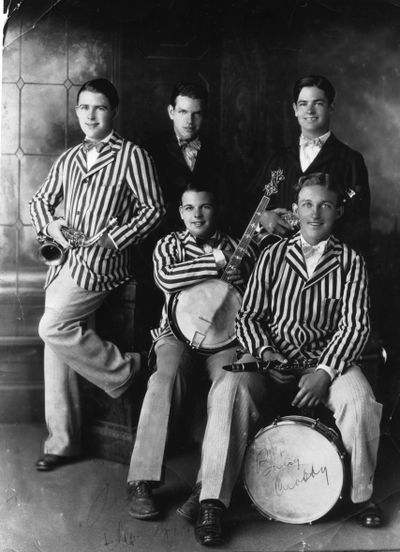This column reflects the opinion of the writer. Learn about the differences between a news story and an opinion column.
Front Porch: Sometimes Bing gets lost in Lilac City

It still surprises me that so many people in Spokane don’t know how Bing Crosby and Spokane are intertwined.
I mean, everybody knows Bing, if for no other reason than for his instantly recognizable voice, especially this time of year when his iconic song, “White Christmas,” is heard everywhere. But we in Spokane should know him better than anyone else because he’s from here – he’s our guy.
Although born in Tacoma in 1903, he came to Spokane as a toddler and grew up here. His fingerprints are everywhere, most especially in and around downtown. He went to Webster Elementary School, which served as Gonzaga’s law school from the ’60s to 2000, Gonzaga High School (located in the Gonzaga University College Hall) and was well on his way to a Gonzaga law degree when he dropped out and went to Hollywood.
As a student, he hung out at Stubeck’s candy and tobacco store on the corner of Sprague Avenue and Wall Street downtown (now home to the Bank of America building). It was Prohibition, and Bing and his college buddies were able to buy drinks from the basement at Stubeck’s, which like other small stores of the time had a little side business going. On his radio show, Bing mentioned that he once stole a candy bar from Stubeck’s and felt so guilty about it that he later sent them a check to cover the cost, plus some. He’d often go to Whitehead’s Dance Pavilion on Sprague Avenue between Washington and Bernard streets, now a parking garage, where instead of dancing, he’d study the musicians and their music.
He and his music group, The Musicaladers, performed everywhere. In the beginning, he didn’t sing, but was just the drummer. One iconic photo of the group in their striped jackets was taken at the Quonset hut dance hall known as Lareida’s at Sprague and Chronicle Road in Spokane Valley. Even in that photo, Bing’s famous eyes and smooth look are unmistakable.
He and his buddy and fellow band member Al Rinker worked at the old Clemmer Theater (Sprague and Lincoln Street), doing live skits in between the silent films. That theater, built in 1915 as an elegant film palace, is one of just a few of its type still standing in the nation. It went through several name changes, including the State and the Met, and in 2006 was renamed the Bing Crosby Theater – because it was on that stage that Bing honed his craft and from where he took off for Hollywood with Rinker. Bing’s wife, Kathryn, came from her home in California for the renaming of the theater in her husband’s name.
Bing often stayed at the Davenport Hotel after fame and fortune came his way; he signed his autobiography at the old Graham’s stationers on Sprague (where Washington Trust now stands). There are echoes of Bing all along Sprague Avenue in downtown Spokane, so much so that some years back a suggestion was floated that the street be renamed Bing Crosby Way.
Bing did leave the city as a young man in his 20s, though he came back often. He found he was making more money at his music gigs than he was as a part-time law assistant for an attorney working in the Great Northern Railway building, where only the Clocktower now remains in Riverfront Park. Fame and fortune beckoned elsewhere.
It’s no secret that Bing did well. His 38 No. 1 hit songs are the most by any musician or group (the Beatles are second with 24 and Elvis Presley is third with 18). His national weekly radio show lasted from 1931 to 1962, the longest run ever. And then there are all those movies, including the “road” films with Bob Hope.
Perhaps most significant is what other entertainers said of him. Frank Sinatra: “When we in the business are talking about who is best, we put Bing Crosby on a pedestal and fight over who is second.” Tony Bennett: “There is one singer who changed the face of this business, and you must watch everything he does. His name is Bing Crosby.”
I know all of these things about Bing Crosby because of two things. One, I’m on the board of the nonprofit Advocates for the Bing Crosby Theater, an organization that works to preserve the historic theater and advance Bing’s legacy. One of our activities is the annual Bing Crosby Holiday Film Festival, this year on Dec. 8 (for information visit www.BingCrosby TheaterAdvocates.org). And two, my friend Bill Stimson, knower of all things Bing, keeps me informed. Stimson is a local historian and author, head of the journalism program at Eastern Washington University, president of ABCT and will have a biography of Bing out late next year.
As part of my ABCT activities, I’ve spent a lot of time in the lobby of the theater talking with the public. And so many times I’ve been asked why the theater is named for Bing. People still express surprise at learning he’s a hometown boy. There’s a saying that you’re never a hero in your own hometown. Maybe that’s the case, but I’ve got a different take on it. Spokane is such a sports-oriented city, and Bing wasn’t known for his athletic prowess, though he did play baseball in school.
But what he didn’t do was do anything famously with a ball. He didn’t dribble one (John Stockton did), throw one (like Mark Rypien) or catch one (a la Ryne Sandberg). Tough to build momentum or get accolades around here without that – even if you’re perhaps the greatest entertainer America ever produced.
